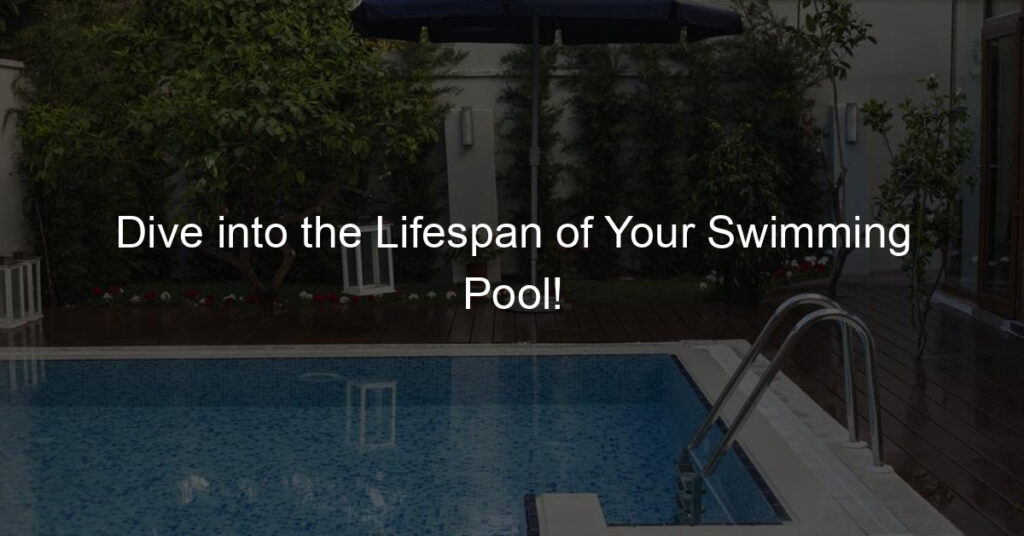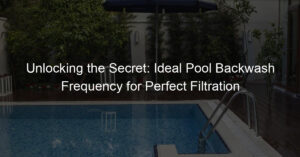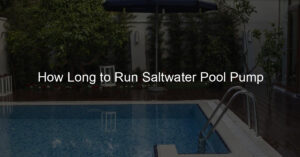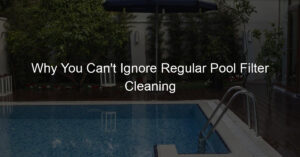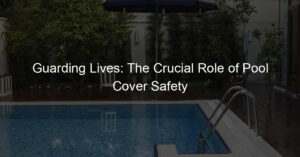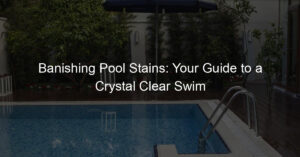Introduction to Swimming Pool Lifespan
Swimming pools are a fantastic addition to any home, providing a place for relaxation, exercise, and fun. However, like any other structure, they have a lifespan. Understanding the lifespan of a swimming pool is crucial for proper maintenance and planning. In this section, we will delve into the concept of swimming pool lifespan and the factors that affect it.
- Understanding the concept of swimming pool lifespan
- Factors affecting pool lifespan
- Materials Used: The type of material used in constructing the pool plays a significant role in determining its lifespan. Concrete and fiberglass pools tend to last longer than vinyl liner pools.
- Maintenance: Regular and proper maintenance can significantly extend the lifespan of a swimming pool. This includes regular cleaning, balancing water chemistry, and timely repairs.
- Usage: The amount and type of usage can also impact the lifespan of a swimming pool. Pools that are heavily used or used in ways they weren’t designed for may have a shorter lifespan.
- Weather Conditions: Extreme weather conditions can also affect the lifespan of a swimming pool. For example, pools in areas with harsh winters may be more prone to damage.
The lifespan of a swimming pool refers to the period during which it can function optimally before it requires significant repairs or replacement. The average lifespan of a swimming pool varies based on several factors, including the type of pool, the materials used, and how well it is maintained. For instance, concrete pools can last up to 50 years, while vinyl liner pools typically last between 10 to 20 years.
Several factors can affect the lifespan of a swimming pool. These include:
In the following sections, we will delve deeper into understanding pool durability and lifespan, the factors that affect it, and how to maintain your pool for an extended lifespan. We will also look at some case studies of long-lasting swimming pools and key takeaways on pool life expectancy.
Understanding Pool Durability and Lifespan
When investing in a swimming pool, one of the most important factors to consider is its durability and lifespan. The type of material used in the construction of the pool significantly impacts how long it will last. Let’s explore the lifespan of different pool materials.
Lifespan of Pool Materials
- Concrete Pools
- Vinyl Liner Pools
- Fiberglass Pools
Concrete pools are known for their durability and longevity. A well-maintained concrete pool can last for over 50 years. However, they require regular maintenance to prevent cracking and algae growth. Despite the high upfront cost and maintenance requirements, many homeowners prefer concrete pools for their longevity and flexibility in design.
Vinyl liner pools are a popular choice due to their lower initial cost and smooth surface. However, the lifespan of a vinyl liner pool is shorter, typically around 10 to 15 years. The liner itself may need to be replaced every 5 to 9 years, depending on usage and maintenance. Despite the shorter lifespan, vinyl liner pools are an attractive option for those looking for a cost-effective and comfortable swimming experience.
Fiberglass pools offer a balance between durability and maintenance. They are resistant to algae growth and have a lifespan of about 25 years. The non-porous surface of a fiberglass pool requires less chemical usage, making it a more eco-friendly option. Despite the higher initial cost compared to vinyl liner pools, fiberglass pools are often chosen for their lower long-term maintenance costs and durability.
In conclusion, the lifespan of a pool largely depends on the material used in its construction. While concrete pools offer the longest lifespan, they require regular maintenance. Vinyl liner pools, on the other hand, are cost-effective but have a shorter lifespan. Fiberglass pools offer a balance between durability and maintenance. Therefore, when choosing a pool, consider not only the initial cost but also the long-term maintenance requirements and lifespan.
Factors Affecting Pool Lifespan
When it comes to the lifespan of a swimming pool, several factors come into play. One of the major categories of these factors is the environment. The environment in which a pool is located can significantly impact its durability and lifespan.
Environmental Factors
There are two main environmental factors that affect the lifespan of a swimming pool: climate and weather conditions, and soil conditions. Let’s delve deeper into these factors:
- Climate and Weather Conditions:
The climate and weather conditions of the area where a pool is located can greatly influence its lifespan. For instance, pools located in areas with harsh weather conditions such as heavy snowfall or extreme heat may require more maintenance and may not last as long as those in milder climates. Pools exposed to lots of sunlight may also experience faster wear and tear due to the UV rays. Moreover, areas with high rainfall can cause water imbalance in the pool, leading to corrosion and damage over time.
- Soil Conditions:
Soil conditions are another crucial factor to consider. The type of soil on which a pool is built can affect its structural integrity. For example, clay soils can expand and contract with changes in moisture levels, potentially causing damage to the pool structure. On the other hand, sandy soils may not provide enough support for the pool, leading to shifting or cracking. Therefore, it’s essential to have a proper understanding of the soil conditions before installing a pool to ensure its longevity.
In conclusion, understanding and considering the environmental factors can go a long way in extending the lifespan of a swimming pool. It’s always wise to take these factors into account when planning for a pool installation or maintenance.
Maintenance Factors
Just like any other valuable asset, swimming pools require regular maintenance to ensure they remain in good condition and serve you for a long time. Two of the most important maintenance factors that significantly affect the lifespan of your pool are regular cleaning and maintaining a proper chemical balance.
- Regular Cleaning
Keeping your pool clean is a basic yet crucial step in pool maintenance. It’s not just about keeping the water clear and inviting, but it also plays a significant role in extending the lifespan of your pool.
Regular cleaning involves removing debris from the pool, cleaning the pool walls and floor, and ensuring the pool filter is clean and functioning properly. This prevents the growth of algae and bacteria, which can cause damage to the pool surfaces and equipment over time.
Experts recommend cleaning your pool at least once a week. However, if your pool is frequently used or if there are a lot of trees and plants around, you might need to clean it more often.
- Proper Chemical Balance
Maintaining a proper chemical balance in your pool is another key factor in pool maintenance. The right balance of chemicals keeps the water safe for swimming and also protects the pool surfaces and equipment from damage.
Imbalanced pool water can lead to various problems. Too much chlorine can cause the pool surfaces to become rough and can even damage the pool equipment. On the other hand, too little chlorine can lead to the growth of algae and bacteria.
It’s important to regularly test your pool water and adjust the chemicals as needed. This not only ensures the water is safe for swimming, but it also helps to extend the lifespan of your pool.
In conclusion, regular cleaning and maintaining a proper chemical balance are two key maintenance factors that can significantly extend the lifespan of your swimming pool. By paying attention to these factors, you can enjoy your pool for many years to come.
Swimming Pool Maintenance for Extended Lifespan
One of the key factors that can significantly extend the lifespan of your swimming pool is regular maintenance. This involves a series of tasks that ensure the pool stays clean, safe, and visually appealing. Let’s delve into the importance of regular cleaning and the steps involved.
Regular Cleaning
Regular cleaning is a crucial part of pool maintenance. It not only keeps your pool looking great but also prevents the buildup of algae and bacteria, which can damage the pool’s structure over time. Here are two essential cleaning tasks you should perform regularly:
- Skimming and vacuuming
- Brushing pool walls and tiles
Skimming involves removing debris such as leaves and insects from the pool’s surface using a long-handled net. This should be done daily to prevent the debris from sinking and becoming harder to remove. Vacuuming, on the other hand, is needed for the debris that sinks to the bottom of the pool. A pool vacuum can be used weekly to clean the pool floor and keep it free from dirt and algae.
Brushing the pool walls and tiles helps remove algae and other buildup that can’t be removed by skimming or vacuuming. This task can be done weekly using a pool brush. Pay special attention to corners and areas behind pool ladders where algae and debris tend to accumulate.
In conclusion, regular cleaning is a simple yet effective way to extend the lifespan of your pool. By skimming, vacuuming, and brushing your pool regularly, you can keep it clean, safe, and ready for use at all times. Remember, a well-maintained pool is not just more enjoyable to use but also lasts longer.
Chemical Balance
Maintaining the right chemical balance in your swimming pool is crucial for its lifespan. This involves monitoring the pH levels and the amount of chlorine in the water. Let’s dive deeper into these two aspects.
- Importance of pH Levels
The pH level of your pool water tells you how acidic or basic it is. The scale ranges from 0 to 14, with 7 being neutral. For a swimming pool, the ideal pH level is slightly basic, between 7.2 and 7.8.
Why is this important? If the pH level is too low (acidic), it can cause corrosion of your pool equipment and irritation to swimmers’ eyes and skin. On the other hand, if the pH level is too high (basic), it can lead to cloudy water and scale formation on your pool surfaces. Both scenarios can shorten your pool’s lifespan.
- Role of Chlorine
Chlorine is a powerful disinfectant. It plays a vital role in keeping your pool water clean and safe by killing harmful bacteria and algae. It also helps to break down impurities in the water.
However, the effectiveness of chlorine is heavily influenced by the pH level of the pool water. If the pH level is too high, chlorine becomes less effective. This means you might need to use more chlorine to achieve the same level of disinfection, which can lead to higher maintenance costs and potential damage to your pool equipment.
In conclusion, maintaining the right chemical balance in your swimming pool is not just about ensuring a pleasant swimming experience, but also about extending the lifespan of your pool. Regular testing and adjustment of your pool’s pH level and chlorine concentration can go a long way in preserving your pool’s health and longevity.
Long-lasting Swimming Pools: Case Studies
Let’s delve into some real-life examples to better understand the lifespan of swimming pools. Here, we present two case studies that highlight the longevity of well-maintained pools and the consequences of neglecting pool maintenance.
- Case Study 1: A Pool that Lasted 50 Years
Our first case study involves a residential swimming pool built in the 1970s. This pool, constructed with high-quality concrete and reinforced with steel, has lasted for an impressive 50 years and counting. The homeowners attribute its longevity to regular maintenance, including frequent cleaning, timely repairs, and consistent water treatment.
They also emphasized the importance of using quality materials during construction. The pool’s durability is a testament to the fact that investing in high-quality materials and regular maintenance can significantly extend a pool’s lifespan.
- Case Study 2: A Pool that Needed Replacement After 10 Years
The second case study involves a pool that had to be replaced after just 10 years. This pool, built with subpar materials and irregularly maintained, quickly deteriorated. The pool’s surface started showing signs of wear and tear within a few years, and the filtration system broke down frequently.
Despite several repair attempts, the pool’s condition worsened over time, leading to its replacement after a decade. This case study underscores the importance of regular maintenance and the use of quality materials in extending a pool’s lifespan.
These case studies clearly demonstrate that the lifespan of a swimming pool is significantly influenced by the quality of materials used during construction and the regularity of maintenance. A well-maintained pool can serve as a source of enjoyment for decades, while neglecting these aspects can lead to frequent repairs and early replacement.
Key Takeaways on Pool Life Expectancy
As we delve into the world of swimming pools, it’s crucial to grasp two key points that significantly impact pool life expectancy. These are the importance of maintenance and the choice of materials used in the pool’s construction. Let’s explore these points further.
- Understanding the Importance of Maintenance
- Choosing the Right Materials for Longevity
Maintenance is the backbone of a swimming pool’s lifespan. Regular upkeep ensures that all components of the pool are functioning correctly, preventing minor issues from escalating into major problems. A well-maintained pool can serve you for many years, providing endless fun and relaxation.
Key maintenance tasks include regular cleaning, checking and adjusting chemical levels, inspecting pool equipment, and addressing any repairs promptly. According to a study, pools that are well-maintained can last up to 20% longer than those that are not. This highlights the critical role that maintenance plays in extending a pool’s lifespan.
The materials used in constructing your pool significantly influence its durability and lifespan. For instance, concrete pools are known for their longevity, with a potential lifespan of up to 50 years. On the other hand, vinyl liner pools may need a liner replacement every 7 to 15 years, but with proper care, the structure itself can last for decades.
Choosing high-quality materials not only ensures your pool lasts longer but also reduces the frequency and cost of repairs. Therefore, it’s crucial to consider the longevity of materials when planning for a pool.
In conclusion, understanding the importance of maintenance and choosing the right materials are key to enhancing your pool’s life expectancy. By paying attention to these aspects, you can enjoy your swimming pool for many years to come.
Conclusion: Extending Swimming Pool Lifespan
In this article, we’ve taken a deep dive into the world of swimming pools, their durability, and lifespan. We’ve learned that with proper care and maintenance, a swimming pool can serve us for many years. Now, let’s summarize our findings and share some final thoughts.
- Summary of Pool Care and Lifespan
- Final Thoughts on Understanding Pool Durability
A swimming pool is not just a luxury, but an investment that requires regular care and maintenance. The average lifespan of a swimming pool can range from 10 to 50 years, depending on the type of pool and the materials used. However, this lifespan can be extended with proper care. Regular cleaning, timely repairs, maintaining the right chemical balance, and protecting the pool during off-seasons are crucial for extending the pool’s lifespan.
Understanding pool durability is key to extending its lifespan. The durability of a pool is determined by factors such as the quality of materials used, the construction process, and how well it is maintained. A well-built and well-maintained pool can withstand the test of time and provide endless enjoyment. Remember, a little effort in maintaining your pool can go a long way in preserving its longevity.
In conclusion, owning a swimming pool is a responsibility that requires time and effort. However, the rewards of a well-maintained pool are worth it. With proper care and understanding of its durability, you can enjoy your swimming pool for many years to come. Remember, the key to a long-lasting swimming pool is in your hands.

